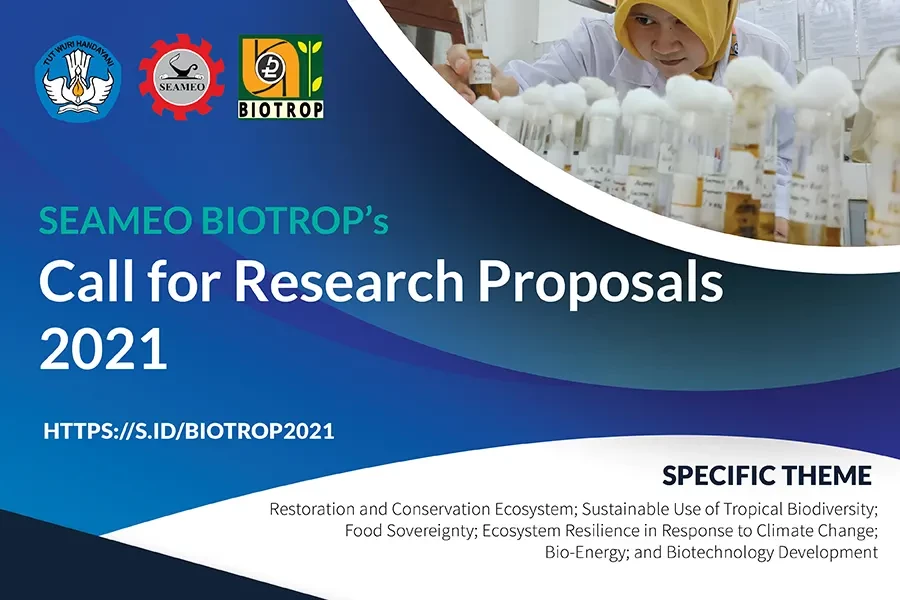- The request for proposals is open to Indonesian National who is currently is hold Doctoral Degree, PhD Student, Elementary, Middle, High, and Vocational School Teachers.
- Non Indonesian Scientist holding Doctoral Degree may submit a proposal in partnership with the Indonesian Scientist who serve as the Principle Investigator.
- Except for the SEAMEO BIOTROP Affiliate Scientist, other applicants MUST collaborate at least with one of the Center researchers as their team member (list attached). Also, to include a research roadmap framework in their proposal for the next 3 years.
- The research proposal must be in English and for applicants with Doctoral Degree is expected to produce an innovation research, in which the propose research budget is not exceeding Rp 120,000,000. Whereas for PhD Students the proposed budget is limited to Rp 50,000,000, and for the School Teachers the proposed budget should not exceeding Rp 15,000,000, respectively.
- The research proposals shall be subjected to external review by a committee that SEAMEO BIOTROP shall form following a set of criteria that the Centre currently uses as follows:
- Relevance of the Proposal (15%)
- Scientific Rigor of the Proposal Components (60%)
- Research Capability of the Proponent/s (10%)
- Feasibility of the Period of Implementation (5%)
- Budget Feasibility (10%)
- The proposal must have the following components:
- Title (The title of the project must be clear, concise, and attractive to generate interest/participation from all actors that are expected to be involved in the implementation of the project)
- Background/Rationale (This section should clearly specify the issues and concerns that the project would like to address. Why is it important to undertake the project? Who will benefit and how?)
- Objectives (The objectives must be concrete enough against which the project’s success or failure can be assessed)
- Review of Related Literature (This must situate the proposal on the current body of knowledge on the subject of the research. Related literature to be cited in the proposal must not be older than 5 years)
- Components and Methodologies (This section must answer how the project objectives can be achieved with the components and methodologies that the project would adopt. It should also specify the partners that would be involved in the implementation of the project)
- Timetable of Activity Implementation (This would specify the overall duration of the project broken down into specific time allocation to undertake the various components and activities)
- Monitoring and Evaluation (This section should specify the way the progress of the project would be assessed according to its objective and timeframe by component, and including the people who will be involved)
- Expected Outputs and Outcomes (This section should enumerate the concrete/tangible outputs and outcomes that the project is expected to produce in relation to its objectives)
- Estimated Budgetary Requirements (The budget must include among others personnel services, travel, materials, equipment and facilities rentals)
- Together with the project proposal, the following documents must also be submitted to BIOTROP:
- Application Letter addressed to BIOTROP Director (Note: The applicant should indicate in the letter the research problem that his/her proposal would be addressing and which BIOTROP program thrust his/her research project proposal falls into)
- Curriculum Vitae of all research project team members
- Letter of Endorsement from the immediate supervisor of the lead research project proponent and also of the research partner from another country
- The research team shall be under contract with SEAMEO BIOTROP within 9 months period broken down as follows: 1 month for pre-implementation, 7 months for during implementation and 1 month for post-implementation phases of the research project. The contract specifies the proponent’s duties and responsibilities, including those that have been mentioned above and other legal and administrative procedures towards ensuring the completion of the research project.
- Disbursement and use of research fund shall follow Daftar Isian Pelaksanaan Anggaran (DIPA) regulations from the Government of Indonesia.
- Other than a completion report, the lead research proponent is expected to submit a draft of an article on the research project results two months after its completion for publication in International journal (e.g., BIOTROPIA, the journal has been indexed by Scopus since 2012). Particularly for researcher with Doctoral Degree is also expected to write a policy brief of the research findings.
- SEAMEO BIOTROP will not consider applications that have incomplete documents as required.
Application Deadline: 22 January 2021
Applicants are advised to send the complete set of application documents to:
Dr. Aslan - Research Department Manager
SEAMEO BIOTROP
Jln. Tajur Raya Km 6, Bogor 16134, Indonesia
Telp: 0251-8323848
Email: aslan@biotrop.org; red@biotrop.org
Attachment:
The expertise of each SEAMEO BIOTROP laboratory
References:
Feeding Asia: The problem wih Asia’s populatin growth for food security : https://www.newfoodmagazine.com/article/29028/feeding-asia-problem-asias-population-food-security-urbanisation/ (Accessed 28 December 2019)
Irsyad, M. I., T. Anggono, R. Nepal, Y. Liu, and F. Taghizadeh-Hesary. 2020. Financing of Energy Efficiency in Public Goods: The Case of Street Lighting Systems in Indonesia. ADBI Working Paper 1194. Tokyo: ADBI.
Nepal, R., N. Paija, F. Taghizadeh-Hesary, and A. Kahtri. 2020. Promoting Energy Efficiency through Foreign Direct Investments: Evidence from South Asian Countries. Forthcoming. ADBI.
https://edition.cnn.com/2019/07/01/world/antarctica-sea-ice-melting-climate-intl/index.html (Accessed 14 July 2019)
https://foodsecurityindex.eiu.com (Accessed 28 December 2020)
 Wednesday, 30 December 2020 on 6:29pm
Wednesday, 30 December 2020 on 6:29pm
